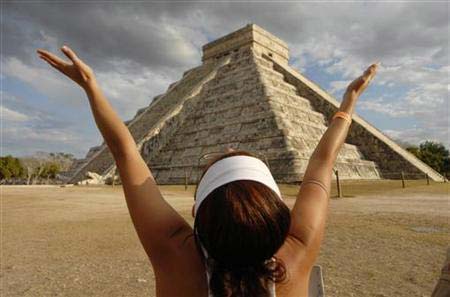|
 A woman raises her arms to receive energy from the sun at the Mayan pyramid El Castillo (The Castle), in Chichen Itza, in the southern state of Yucatan, Mexico March 21, 2009. |
|
Nearly 15 percent of people worldwide believe the world will end during their lifetime and 10 percent think the Mayan calendar could signify it will happen in 2012, according to a new poll. The end of the Mayan calendar, which spans about 5,125 years, on December 21, 2012 has sparked interpretations and suggestions that it marks the end of the world. "Whether they think it will come to an end through the hands of God, or a natural disaster or a political event, whatever the reason, one in seven thinks the end of the world is coming," said Keren Gottfried, research manager at Ipsos Global Public Affairs which conducted the poll for Reuters. "Perhaps it is because of the media attention coming from one interpretation of the Mayan prophecy that states the world 'ends' in our calendar year 2012," Gottfried said, adding that some Mayan scholars have disputed the interpretation. Responses to the international poll of 16,262 people in more than 20 countries varied widely with only six percent of French residents believing in an impending Armageddon in their lifetime, compared to 22 percent in Turkey and the United States and slightly less in South Africa and Argentina. But only seven percent in Belgium and eight percent in Great Britain feared an end to the world during their lives. About one in 10 people globally also said they were experiencing fear or anxiety about the impending end of the world in 2012. The greatest numbers were in Russia and Poland, the fewest in Great Britain. Gottfried also said that people with lower education or household income levels, as well as those under 35 years old, were more likely to believe in an apocalypse during their lifetime or in 2012, or have anxiety over the prospect. "Perhaps those who are older have lived long enough to not be as concerned with what happens to their future," she explained. Ipsos questioned people in China, Turkey, Russia, Mexico, South Korea, Japan, the United States, Argentina, Hungary, Poland, Sweden, France, Spain, Belgium, Canada, Australia, Italy, South Africa, Great Britain, Indonesia, Germany. (Read by Nelly Min. Nelly Min is a journalist at the China Daily Website.) (Agencies) |
根据一项新调查,全世界有近15%的人相信世界末日将在自己有生之年到来,10%的人认为玛雅日历预示着世界将在2012年终结。 跨越5125年的玛雅日历终止于2012年12月21日,这引发了各种关于世界末日的解读和联想。 益普索全球公共事务部为路透社开展了这一调查。该部门的调研主管凯伦•戈特弗里德说:“或是认为世界会在上帝手里终结,或是认为世界将因自然灾害或政治事件毁灭,不论是何种原因,全球有七分之一的人认为世界末日即将来临。” 戈特弗里德说:“也许是因为媒体高度关注对玛雅预言的一种解读,认为世界将在公历2012年‘终结’。”她补充说,一些玛雅学者对这种解读提出了质疑。 这一跨国调查涵盖了20多个国家的16262个人,各国受访者的应答有很大差别。只有6%的法国人认为有生之年将会见到世界末日,与此同时,有22%的土耳其人和美国人,以及比例略低的南非人和阿根廷人相信末日将至。 只有7%的比利时人和8%的英国人担心世界会在自己有生之年终结。 此外,全球约有十分之一的人称自己为2012年即将到来的世界末日而感到恐惧或焦虑。有这种担忧的俄罗斯人和波兰人最多,英国人最少。 戈特弗里德还说,教育程度或家庭收入低的人,以及那些35岁以下的人,更倾向于认为有生之年或2012年世界末日会来临,更容易因“末日”将至感到焦虑。 她解释说:“也许那些年纪较大的人活得够久,因而对未来发生的事情不那么担心。” 益普索公司调查了中国、土耳其、俄罗斯、墨西哥、韩国、日本、美国、阿根廷、匈牙利、波兰、瑞典、法国、西班牙、比利时、加拿大、澳大利亚、意大利、南非、英国、印尼、德国的居民。 相关阅读 (中国日报网英语点津 陈丹妮 编辑:Julie) |
|
Vocabulary: impending: 即将发生的;逼近的 Armageddon: 世界末日善恶决战的战场 apocalypse: 世界末日的大灾难 |
